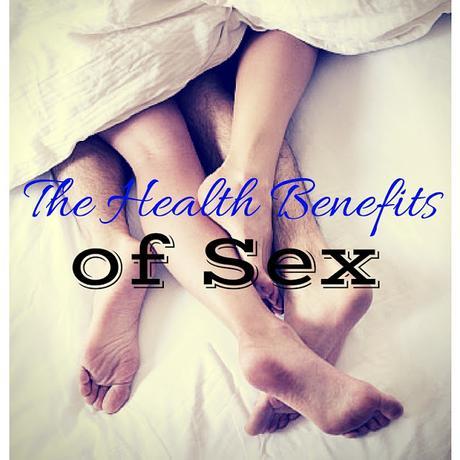
Sex. Yes that's the topic of today's post. Now before I go any further I should add that I am not a sex expert, nor have I had any specific training in sexual health. However, as a girl who has watched all the Sex and the City Seasons at least 5 times I figure that counts for something (joking).
In all seriousness, if you had asked me a couple years ago when I first started the blog if I would ever talk about sex on here I probably would have laughed. But on my mission to discuss all topics health related I realized that sexual health is just as important as our physical, emotional and mental health, and that I shouldn't ignore this often not talked about subject. Plus you so often hear people talk about the health benefits of sex. Things like better mood, better sleep etc. But I have always wondered, is there any evidence to actually support these claims? So I decided to take a look at the evidence and see what I could find. And the number of benefits I found was more than I could have imagined! In fact I found 10 scientifically proven health benefits of sex. Yes 10! So keep reading to learn more.
1. Improved Mood and Mental Health
Women who have more frequent sexual intercourse have been found to be less depressed. One interesting factor is that this only seems to be related to intercourse without a condom (i.e. where semen enters the vaginal canal) making researchers wonder if semen has anti-depressant properties. It's an interesting thought isn't it? And something that is currently being investigated, so I may have more information to share with you in the future. Now, I would never advocate for sex without some sort of barrier protection, unless of course you are in a trusted relationship and have been tested for sexually transmitted infections.As well, a recent review showed that the frequency of sexual intercourse was a significant predictor of both men's and women's satisfaction with their mental health. It was also found that women who experience orgasms through vaginal intercourse were more satisfied with their mental health than those who didn't. Now, I highly doubt that your psychologist or psychiatrist has recommended more sex to help improve your mood, but perhaps they should?
2. Increased Intimacy
In one study examining women, frequency of intercourse correlated with increased satisfaction, intimacy, trust, passion and love in their relationships. What's more, these same women reported that the more orgasms they experienced from intercourse the more they felt satisfied, passionate, trusted and loved in their relationships. Similarly, data from the US found that married women felt more sexually and maritally satisfied with their relationships when they had sexual intercourse at least once per week. When looking at men, it has also been shown that they feel more satisfied in their relationships with increased frequency of intercourse.3. Better Quality of Life
Quality of life is a broad concept with many definitions. According to Wikipedia, "quality of life is the general well being of individuals and societies". Another definition, that fits even better with my view of the world is that "quality of life is daily living enhanced by wholesome food and clean air and water, enjoyment of unfettered open spaces and bodies of water, conservation of wildlife and natural resources, security from crime, and protection from radiation and toxic substances". Regardless of how you define it, quality of life is extremely important. And both men and women report increased satisfaction in life (and hence quality of life) with an increased frequency of sexual intercourse.4. Reduced Pain
It has been shown that sexual intercourse, in both men and women, can have an analgesic effect (in other words it decreases pain). It has also been shown in women that genital stimulation can increase their pain threshold (ie. they don't feel pain as easily). Now, I couldn't find any studies that looked at this effect in patients with chronic pain, but I am curious to know if something similar might be found? If so, sexual intercourse could provide a very useful therapeutic tool if recommended and used properly.5. Weight Loss
In both men and women, more frequent sexual intercourse is correlated with decreased waist and hip measurements, which are used as markers of overweight and obesity. And considering that about 70% of the population is considered overweight, and more than 30% considered obese, this has some very important implications. I hear patients complain all the time how difficult it is to lose weight, and exercise regularly, but I have never yet heard anyone complain about having sex. So go get busy everyone! (and if anyone asks, the doctor told you so).6. Improved Cardiovascular Health
Heart disease is everywhere. In fact, it's the most common cause of death in North Americans. That's a scary fact. Especially when many cases of heart disease are completely preventable. Better nutrition, exercise and more sexual intercourse can all help lower your risk of heart disease. Studies have shown that the risk of a cardiac event is lower in those who engage in more frequent sexual intercourse. As well, studies have shown that heart rate variability can be increased through sexual intercourse, and that overtime this is predictive of lower mortality (death) in both patients with, and without underlying heart disease. Other studies have shown that men who have more frequent intercourse have lower blood pressure (which is a risk factor for heart disease). And finally, the risk of death from heart disease has also been found to be lower in people who have more sexual intercourse. Now, if you have just had a cardiac event, it is often recommended that you do not engage in sexual activity for a certain period of time, so make sure you check with your doctor to find out what is safe for you.7. Safer Pregnancies
Preeclampsia is a very dangerous syndrome that can develop during pregnancy. It is a multi-organ disorder characterized by the new onset of high blood pressure, increased excretion of protein in the urine or end-organ dysfunction, or both, in the last half of pregnancy. Women, and their babies, who develop preeclampsia are at an increased risk of death or serious organ damage. Remarkably, multiple studies have shown that increased frequency of sexual intercourse is related to a decreased risk of preeclampsia in women. Why this occurs is still up for debate, but hopefully one day soon someone will figure it out. I for one am certainly interested!8. Decreased Risk of Prostate Cancer
Prostate cancer is one of the most common types of cancers in men. And interestingly, multiple studies have shown that men who get prostate cancer have less frequent sexual intercourse than men who do get prostate cancer. Now, there are also studies that have not found this same effect, and there are no cause and effect (otherwise known as randomized control trials) examining this association (and there never will be since there would be too many ethical issues to try and do such a study) so it is difficult to make any firm conclusions, but considering how common prostate cancer is, it is definitely something to keep in mind.9. Decreased Risk of Breast Cancer
Similar to the prostate cancer story in men, women who have more intercourse have been found to be less likely to develop breast cancer. And considering that breast cancer is the most common type of cancer among women, this could have some very important health implications. Now, it must be emphasized that these studies are not cause and effect studies. They are association studies. So it is entirely possible that some other factor could affect these results, but it is still something to consider.10. A Longer Life
Sex may just be the unspoken fountain of youth. Many studies have shown that people who live longer have more sexual intercourse. People are always on the look out for that magic supplement, drink or diet that will keep them young and healthy. Perhaps they should be turning to their partner instead?Alright everyone, there you have it. Ten scientifically proven health benefits of sex. I have to say this was a fun post to write. I learned a lot with this one, and I hope you did too. If you have any questions please let me know. And if you are interested in some further reading I have provided a list of references at the end of this post where the information from this article came from.
As always I would love it if you followed me on my social media pages on Instagram,Facebook, Pinterest and Twitter.
*** Pin This Post For Later ***

DISCLAIMER: The statements made on this website have not been approved by the Food and Drug Administration. The information is not intended to diagnose, treat, cure, or prevent disease. You assume full responsibility for how you use this information. Always consult with your physician or other health professionals before making any diet or lifestyle changes.
References:
1. Brody & Costa, 2009. Satisfaction (sexual, life, relationship, and mental health) is associated directly with penile-vaginal intercourse, but inversely with other sexual behavior frequencies.
2. Costa RM & Brody S. Women’s relationship quality is associated with specifically penile-vaginal intercourse orgasm and frequency. J Sex Marital Ther 2007;33:319–27.
3. Gallup GG, Burch RL, Platek SM. Does semen have antidepressant properties? Arch Sex Behav 2002;31:289–93.
4. Komisaruk BR, Whipple B. The suppression of pain by genital stimulation in females. Ann Rev Sex Res 1995;6:151–86.
5. Brody S. Slimness is associated with greater intercourse and lesser masturbation frequency. J Sex Marital Ther 2004; 30:251–61.
6. Brody S, Preut R. Vaginal intercourse frequency and heart rate variability. J Sex Marital Ther 2003;29:371–80.
7. Hall, S. et al. Sexual activity, erectile dysfunction, and incident cardiovascular events. Am J Cardiol. 2010 Jan 15;105(2):192-7.
8. Einarsson JI, Sangi-Haghpeykar H, Gardner MO. Sperm exposure and development of preeclampsia. Am J Obstet Gynecol 2003;188:1241–3.
9. Le MG, Bachelot A, Hill C. Characteristics of reproductive life and risk of breast cancer in a case-control study of young nulliparous women. J Clin Epidemiol 1989;42:1227–33.

